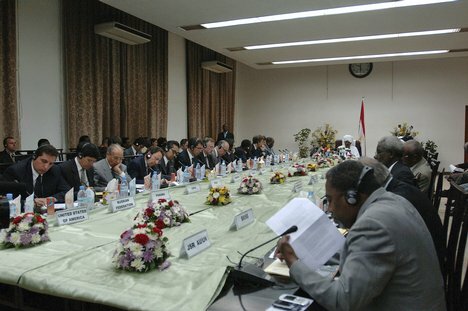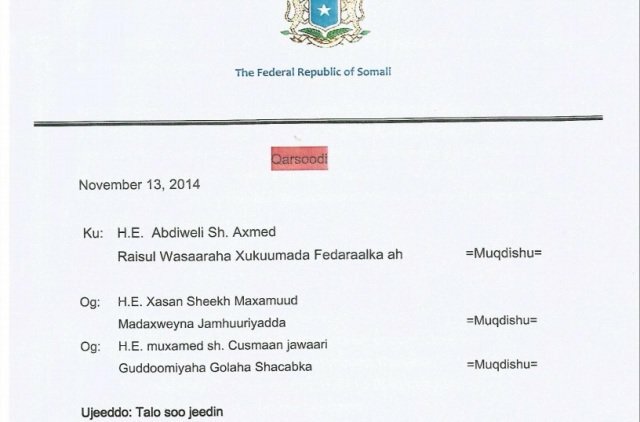Somalia: The AU’s Peace and Security Council meets.
 Bartamaha (Nairobi):- On Wednesday the Peace and Security Council held a session in Addis Ababa on current developments in Somalia. It was extensively briefed by the Deputy Representative of the AU Commission to Somalia, by Ambassador Mahiga, the new Special Representative of the UN Secretary-General to Somalia, by Ambassador Kongit Sinegiorgis, the Permanent Representative of Ethiopia to the AU, and by a representative of the TFG.
Bartamaha (Nairobi):- On Wednesday the Peace and Security Council held a session in Addis Ababa on current developments in Somalia. It was extensively briefed by the Deputy Representative of the AU Commission to Somalia, by Ambassador Mahiga, the new Special Representative of the UN Secretary-General to Somalia, by Ambassador Kongit Sinegiorgis, the Permanent Representative of Ethiopia to the AU, and by a representative of the TFG.
The AU Commission’s Deputy Representative detailed the challenges facing the TFG and AMISOM forces on the ground, and emphasized the need for the AU and the international community to swiftly provide support. The TFG’s representative focused on the dangers from the onslaught of terrorism, underlined by the terrorist atrocity at the Mona Hotel the previous day in which 6 parliamentarians had died as well as twenty civilians. He stressed the need for immediate action to support TFG forces materially and logistically and called on the AU and the international community to contribute to the efforts of the TFG and AMISOM in a concrete way.
Ambassador Mahiga noted that there were signs of growing cooperation and coordination among members of the international community. He said destabilization activities against those areas which had had peace and stability for quite some time should be a concern to the region, to Africa and the international community. He emphasized the critical role to be played by IGAD member states and AMISOM; and emphasised the need to expeditiously implement the issues that had been discussed at the sideline meeting in Kampala. He informed the Council about the meeting scheduled between the AU Commission’s Special Representative on Somalia, UNPOS and AMISOM’s field commander in New York on September 13th. .
Ambassador Kongit Sinegiorgis, speaking on behalf of the current IGAD Council Chair, Ethiopia, recalled that the AU Assembly in Kampala had endorsed the decisions of IGAD Heads of State and Government in July including the decision to deploy another 2000 peacekeepers for AMISOM immediately. She expressed IGAD’s belief that the Council would encourage the relevant bodies to make the necessary efforts for its timely implementation. Ambassador Kongit said that while the leadership of the TFG had yet to show the necessary determination and resolve to work together, the consultations between the TFG and Ahlu Suna wal Jama’a earlier this month, evaluating the implementation of their Agreement, had been constructive; the two parties had come a long way. They had held extensive discussions on how to implement their agreement fully and shown determination to move forward.
An important development, Ambassador Kongit noted, was the international community’s current activity. Immediately after the Kampala sidelines’ meeting, a US-led demarche, involving Somalia’s partners and neighbours, was carried out in various capitals, with a view to soliciting support for the TFG and AMISOM in terms of equipment, logistical support and troop contributions. This was an encouraging development and would continue to help concretize necessary support for Somalia. As the IGAD Summit in July made clear, the fighting in Somalia is no longer between Somalis but rather between the people of Somalia and international terrorism. Ambassador Kongit took the opportunity to underline that IGAD was committed to continue to work closely with the AU and the UN. The need for constructive engagement, not disengagement
The suicide bombing and shoot-out on Tuesday at the Mona Hotel in Mogadishu killed thirty people, six of them MPs and four government officials. The remainder of those who died were innocent civilians. The attack came only a month after the atrocity in Kampala when 76 people watching the World Cup final on Television died in two suicide bombings. In both cases Al-Shabaab did not just admit responsibility; it boasted of it, as indeed it normally does when it has carried out an atrocity of this nature. The deaths for which it has been responsible in Mogadishu alone now run into thousands. They have even included on more than one occasion, dozens of women involved in street cleaning, as well as commuters attempting to get to work on buses, and children on their way to school. The only occasion when Al-Shabaab appeared reluctant to admit to such action was when a suicide bombing in December last year killed 20 people at a graduation ceremony at a hotel in Mogadishu – among the dead were four ministers, and a number of the first doctors to graduate in Somalia for over 20 years. The wave of anger was so great that even Al-Shabaab originally refused to acknowledge what it had done.
A recent report on Al-Shabaab’s activities summed these up: “Men are forced to grow beards. Women can’t leave home without a male relative. Music, movies and watching sports on TV are banned. Limbs are chopped off as punishment, and executions by stoning have become a public spectacle.†Those that try to speak out against the activities of Al-Shabaab are routinely killed. Following some severe losses in fighting against the government in Mogadishu, Al-Shabaab, now largely run by foreign fighters trained in Afghanistan, is demanding that households in areas it controls must contribute a boy to the ranks of its fighters. Those that have no children have to pay $50 a month, a sum equivalent to the average annual per capita income of Somalis.
And Al-Shabaab is the organization to which some commentators, with their oxymoronic concept of “constructive disengagementâ€, want to hand over Somalia. Questions can legitimately be raised about the internal disputes of the TFG and the TFIs. It is pertinent to look at the international community’s lack of support for Somalia and its government. None of this, however, can provide any justification for handing the population of Somalia over, lock, stock and barrel, to Al-Shabaab which subjects those it controls to “unrelenting repression and brutality†and whose leaders have no roots in Somalia. Al-Shabaab has, in fact, neither an Islamic nor a Somali agenda. It has no respect for humanity, nor indeed for the religion it professes to follow, as it demonstrated with its latest atrocity, murdering innocent Muslims during the month of Ramadan.
One reason for the calls for “constructive disengagement†comes from the facile acceptance of claims by Al-Shabaab and its supporters that it controls most of Somalia. It doesn’t. This is a description routinely made with no reference to reality. The frequent associated description of the TFG as holding no more than a few streets in Mogadishu is also highly misleading. In both cases these claims ignores the reality of Somali politics and the situation on the ground. The Puntland administration, for example, is in full control of the northern areas, including the regions of Bari, Nugal and part of Mudug, though it is currently facing a small insurrection by an Al-Shabaab warlord in the Galgala mountains along its border with Somaliland. Ahlu Suna wal Jama’a, an organization now participating in the TFG, controls most of the central region of Galgudud, as well as large parts of Hiiraan and Middle Shebelle. Al Shabaab does operate in other areas and controls a number of towns including Kismayo, Baidoa and Bardera but in the regions of Gedo, Middle Juba, Bakool and Lower Shebelle, they face opposition from various sources, including clan militias, and warlords as well as pro-TFG forces.
The major focus of most reporting and comment has been on Mogadishu where Al-Shabaab has certainly been making considerable efforts to oust the TFG. It has so far failed, and with AMISOM building up to its mandated 8,100 strength, and TFG security forces currently increasing with the arrival of hundreds of troops and police trained outside Somalia by IGAD members and by the EU, Al-Shabaab is unlikely to succeed. At the moment, AMISOM actually holds 8 of Mogadishu’s 16 districts and is currently expanding into another 4. Al-Shabaab controls no more than a quarter of the city, four of Mogadishu’s districts (Wardiglei, Yaqshid, Hiruwa and Karan), though they regularly lob shells and fire mortars into other areas. Some commentators endlessly repeat Al-Shabaab propaganda suggesting that AMISOM troops are “inflicting thousands of civilian casualties, indiscriminately shelling neighborhoods in Mogadishuâ€, just as they used to claim that Ethiopian soldiers did the same. Even proponents of “constructive disengagement†should be able to see these allegations for what they are: exaggerated and inaccurate propaganda from an organization which has itself publicly and proudly carried out the slaughter of thousands in Mogadishu.
This is the background against which proponents of “constructive disengagement†like Ms. Bruton and others, including the Council for Foreign Relations, want the international community to withdraw all support for the TFG and hand Somalia over to an extremist organization led by terrorists from the battlefields of Afghanistan and guided by Al Qaeda. Those who support this negative scenario consistently claim that no military solution is possible. They apparently believe a political solution will simply appear in a puff of smoke out of a possible post Al-Shabaab collapse. Given that Somalia’s political crisis began 19 years ago with just such a collapse after the fall of Siad Barre, it is hard to see how such a scenario can generate any optimism.
A central point is that none of these analyses appear aware that IGAD, the neighboring states and the African Union and the TFG, do in fact all agree that deploying military forces in isolation will not resolve Somalia’s problems. Everybody is fully conscious of the need for the TFG to extend the process of peace and reconciliation. This indeed is what led to the Djibouti Agreement in August 2008, to the TFG/Ahlu Suna wal Jama’a agreement earlier this year and to the memorandum of understanding between the government of Puntland and the TFG. As we have noted before, proponents of “constructive disengagement†have no understanding of either local politics or IGAD policies, nor indeed of Al-Shabaab’s aims and intentions. If Somalia is simply abandoned, as Ms. Bruton suggests, the whole of East Africa will be threatened with destabilization, as Al-Shabaab has already made clear. Not content with bombings in Uganda, in the last couple of months it has launched a number of cross border raids into Kenya.
Nobody denies that the TFG could do more to implement its policies and agreements, nor that the international community needs to demonstrate the political will to provide the necessary resources. The required shift in the balance of power in Mogadishu still depends upon the donors producing and supporting a committed plan of action. Boosting AMISOM and TFG security is one aspect of this in order to establish control in the capital, other elements include the ongoing capacity building for the TFG and the TFIs, constitutional drafting for the end of the transitional period and the widening of the peace and reconciliation process. All this, as IGAD has frequently emphasized, must be coupled with a vigorous and realistic response from the international community, not the abandonment of 10 million Somalis to international terrorism.
—————————————–
Source: Ethiopian Journa
Comments
comments
 Calendar
Calendar




































